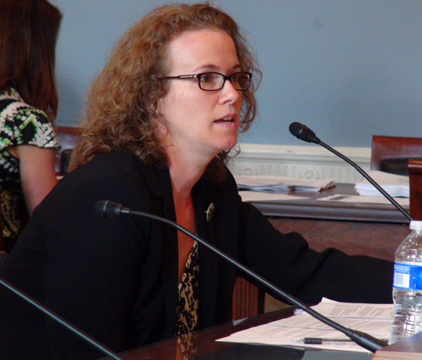Vermont Dairy Farmer Tells House Agriculture Committee about Biotechnology’s Benefits to Consumers
March 24, 2015
 Washington, D.C. – The added costs imposed by mandatory labeling for genetically-modified organisms could increase the price of food to consumers while driving smaller farms out of business, according to Vermont dairy farmer Joanna Lidback (pictured speaking at a congressional hearing in Washington, D.C., in July 2014), who said that the use of GMO crops is important to her farm’s economic sustainability.
Washington, D.C. – The added costs imposed by mandatory labeling for genetically-modified organisms could increase the price of food to consumers while driving smaller farms out of business, according to Vermont dairy farmer Joanna Lidback (pictured speaking at a congressional hearing in Washington, D.C., in July 2014), who said that the use of GMO crops is important to her farm’s economic sustainability.
In testimony presented Tuesday before the House Agriculture Committee, Lidback, who farms in Westmore, Vermont, with her husband and two young sons, said that building an economically viable small family business has led them to “fully embrace using technology to farm better and with less impact on our surroundings” – and part of that entails using GMO seed varieties that grow best in New England.
“We would want the choice of the best seed regardless of breeding technology; genetic engineering offers the best options,” she said, explaining that their 200 acre farm in Vermont’s Northeast Kingdom has a shorter growing season that limits the variety of crops they can grow. If marketplace demands were to force them to use non-GMO feed grains – most of which would be certified organic – the farm’s feed bill would more than double each month, from $5,328 to $12,000.
“I do not see how we could profitably farm in the long term with those increased feed costs,” Lidback said. “I also believe that biotechnology enables us to lessen the environmental impact that growing can have because less fertilizer and pesticides are used to grow an abundant crop.”
Lidback testified on behalf of Agri-Mark Dairy Cooperative, which is a member of both the National Council of Farmer Cooperatives and the National Milk Producers Federation. Lidback keeps a blog documenting her family’s life on the farm (farmlifelove.com).
She told the committee’s members that attempts at mandatory labeling of foods derived from GMO processes are aimed at arbitrarily limiting choices, for farmers and consumers alike. She said that consumers have a right to know “that the meals they serve at the family dining table every night are safe and nutritious. But a very small percentage of the population should not be able to impose their personal, non-science based food preferences on the rest of us – prompting food prices to increase and driving farms like mine out of business.”
Lidback said that mandatory labels on foods with biotech ingredients are not necessary, but that “if consumers are to drive some sort of label requirement, I believe it should be done in a cohesive way at the federal level.” Lidback said that consumers who want information about how their food is sourced can get information from companies using voluntary labeling systems, including the USDA’s Certified Organic program and the use of third-party verification of a “Non-GMO” label.
She said a patchwork quilt of state laws, whereby some states such as Vermont impose labeling requirements that neighboring states do not, would raise questions “about whether or not the product is the same. This serves no one’s interest – not consumers, not farmers, not food producers.”
The National Milk Producers Federation, based in Arlington, VA, develops and carries out policies that advance the well-being of dairy producers and the cooperatives they own. The members of NMPF’s cooperatives produce the majority of the U.S. milk supply, making NMPF the voice of more than 32,000 dairy producers on Capitol Hill and with government agencies.
Agri-Mark, with more than a billion dollars in 2014 sales, markets more than 300 million gallons of farm fresh milk each year for about 1,200 dairy farm families in New England and New York. The cooperative is headquartered in Methuen, Mass., has been marketing milk for dairy farmers since 1913, and actively represents their legislative interests in the Northeast and in Washington, D.C.
The National Council of Farmer Cooperatives is a national association representing America’s farmer cooperatives. There are nearly 3,000 farmer cooperatives across the U.S. whose members include a majority of our nation’s more than 2 million farmers, ranchers and growers. These farmer cooperative businesses handle, process, and market agricultural commodities and related products; furnish farm supplies; and provide credit and associated financial services. Earnings from these activities are returned to their members on a patronage basis. Farmer cooperatives also provide jobs for nearly 250,000 Americans, many in rural areas, with a combined payroll of over $8 billion. Additional information about NCFC can be found at www.ncfc.org.
Download





